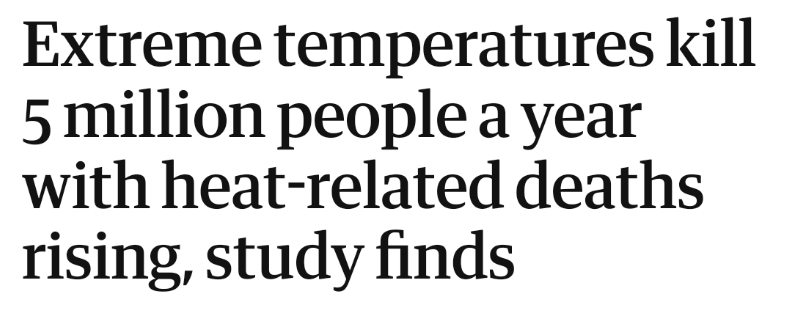Our Questionable Climate "Catastrophe" - Part 2
Asking (and focusing) on the wrong questions is a classic bait and switch in an attempt to distract from legitimate problems and faulty logic.
In a previous post (Our Questionable Climate "Catastrophe" - Part 1) , I talked about the lack of actual warming in southern Manitoba where I live. By that, I mean our summers haven't gotten any hotter at all, just a little “less cool” at night. Our winters, on the other hand, have actually gotten a tiny bit warmer on average. This fact alone should cause anyone who's lived here for more than a few years to want to crack open a cold one in celebration. Hardly what I would term a “dire emergency”.
For Part Two, I'm going to explain to you how Part 1 is actually completely irrelevant, as is this question that seems to be on everyone's mind:
What can we do to mitigate global warming/climate change?
This extraneous question is a perfect example of asking the wrong question in order to not have to address other real, pressing concerns. It so totally misses the point, and yet it still takes up huge amounts of valuable time and resources in terms of argument, stress, and yes - MONEY. In short, it's a distraction from problems that really matter.
Instead, how about we ask this question:
What can we do to mitigate the deaths that we know (historically) are going to occur due to “non-optimal ambient temperatures" worldwide?
“Non-optimal ambient temperatures" (in case you’re not aware) is a fancy way of saying, “temperatures that can kill you from extended exposure”.
In order to answer this question, first we need to know just how serious an issue this is. Because let's face it, that's the bottom line, right? Not CO2, not GHGs, not “climate deniers" — it's the lives of actual people. At least, I hope that's the bottom line. I mean, if climate change is killing millions of people all over the world, then surely, we could all agree that something should be done to help these people, right?
There was a study in The Lancet from July 2021 that found that there are over five million deaths per year globally from non-optimal ambient temperatures. I wrote about this earlier in a previous post entitled Death by a Thousand Degrees. It’s a good one and you should probably read it.
Anyway, of these over five million deaths per year, can you guess how many were due to extreme heat? Must've been a lot, right? Thankfully, there's no need for you to guess, because I'm going to tell you. According to the Lancet study, about 500,000 of these deaths are attributable to heat. That leaves the remaining 4.5 million deaths each year that are attributable to cold. Shocked? I assume you might be if all your information comes from the mainstream media - especially the state-sponsored legacy media we have in Canada.
Yet here we are - 4.5 MILLION DEATHS. Every year. From COLD. If you happen to be bad at math, those numbers are saying that globally, cold related deaths outnumber heat related deaths by 9 to 1. In Canada and the US, that ratio is more like 40 to 1. Yes, it gets cold here.
If you're someone who just likes to read headlines and then move on (as apparently many people do), you might be forgiven for getting the wrong impression from this headline in The Guardian (also from 2021):
Wow, it almost sounds like they’re saying that heat-related deaths kill five million people a year, doesn’t it?
What's really interesting about this Guardian article is that it cites the exact same study I mentioned earlier (you know, the one that says cold kills nine times as many people as heat does), only what they focus on (and what they want you to focus on) is the slightly rising heat deaths, not the more diminishing cold deaths. It’s comforting to note that, according to this article, this has “prompted calls for better housing insulation and more solar-powered air conditioning”. Apparently, no calls for more affordable heating fuel though…
The real story is touched on briefly in the article, but like I said, most won’t even make it past the headline. I'm actually surprised the whole headline isn't in capital letters and bookended with “BREAKING” and four exclamation points. This is how media works, because editors are well aware of people’s reading habits - it’s their job.
So, what are we currently doing about this, you may ask? Well, for starters, we're taxing anything to do with fossil fuels, which just happen to be the single most important tool we have to keep these people warm in the winter. We're also promoting technology that is way more expensive and not nearly as reliable or efficient as the fossil fuels poor people can barely afford as it is. Oh, and we're also paying a multitude of politicians and their entourages to jet around the world, virtue-signaling all the way while they attend “climate conferences” with a historical net result of somewhere around zero when it comes to reducing carbon emissions. In fact, there's a good chance that number is likely less than zero at this point.
So far, that's not a great start.
Here's the good news:
Over the last 20 years, though heat related deaths have increased slightly, cold related deaths have actually decreased by much more. Is this a result of all our combined global efforts and climate conferences to combat climate change? Pretty sure it's not…
When you look at how much effort is expended by these alarmists in trying to make their point, you really have to wonder if they even believe it themselves. We've heard so much about the “97% consensus” which (according to the study itself), states the only real consensus is that humans may have some sort of effect on global warming (even if it's very minimal). Of course, this is not at all how it's promoted - especially by its authors. So, what's the real goal here?
The Intergovernmental Panel on Climate Change
If you're not hip to the climate change lingo, the IPCC is an organization set up by governments, funded by governments, with government appointed scientists, whose main purpose is to provide governments with policies relating to climate change. The fact that these policies ultimately result in higher taxation of the people who did not vote for any of these guys is highly suspicious, if not terribly concerning. It's pretty easy to follow the money, and as I mused in this article, surely there are no conflicts of interest going on here at all…
Facts are facts. Models are not facts, and yet that's what this manufactured “consensus” is evidently based on. Not that models are useless, but they are essentially useless for this.
Now back to the real problem of all those people freezing to death each winter.
To put it very simply, when these same people (the ones with the policies whom no one voted for) talk about needing 100 TRILLION DOLLARS (no, that’s not a typo) to transition to a “green economy” and yet there's still people starving and freezing to death all over the world, and FOSSIL FUELS ARE THE SOLUTION - there is something terribly wrong.
No one on earth cares about some computer model foretelling a fiery doom when they can barely pay their rent or put food on their tables, and they're struggling to stay warm in the winter. If the real question here is not, “How do we make people's lives better right now?” then it's the wrong question. In this very real sense, the very real problems here are the policies that are being advocated - not the science. Well, that and the silencing of dissent, but that's a topic for another time.
For this reason, all this talk about keeping the global temperature to within 1.5° of pre-industrial levels (or whatever the latest nonsense is) is so completely missing the point, it borders on lunacy. The reason I'm not calling it actual lunacy is because I find it difficult to believe that anyone is really this stupid. Cults will do that to people though, and the leadership is rarely innocent.
The Bottom Line
Now, the whole point of this is exactly what I said earlier:
When the questions being asked are constantly focusing on government interventions which ultimately result in more taxes and restrictions that are disproportionately going to affect poor people; and when these policies have a 20-year record of doing absolutely nothing for the environment, these are not only the wrong questions, but they are very likely a malicious attempt at distraction from real issues that would likely be much more difficult to use as justification for another tax.
I don’t really know what the answer to that original question of mine is, but I’m pretty sure I’d much rather put 100 trillion dollars towards trying to answer that one than any of the so-called “green initiatives” I’ve heard about. And better yet, if we end up doing absolutely nothing about it and saving the 100T, then at the very least maybe we can just relax a bit and enjoy the warmth. Evidently there are a lot of people who are going to need it.







